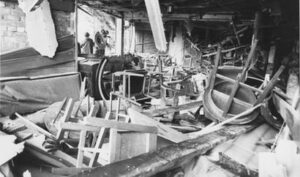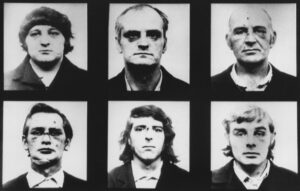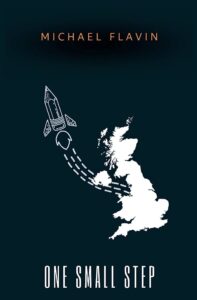Writing the Birmingham pub bombings

By Michael Flavin
The Birmingham pub bombings of 21st November 1974 were one of the most notorious incidents of The Troubles. Twenty-one people were killed and over 180 injured by bombs planted in two pubs: The Tavern in the Town and The Mulberry Bush.
A third bomb, at a branch of Barclay’s bank, failed to explode. The bombers, acting without authorisation from IRA army council, failed to give their warning to the Birmingham Post and Mail because of a vandalised phone box in the city centre.[1] They had no contingency plan in place and by the time the police were alerted it was too late to evacuate the pubs.
Twenty one people were killed and over 180 injured in two IRA bombs that exploded in Birmingham, England on 21 November 1974.
The bombings can be understood in the context of the IRA’s ‘mainland campaign’ of the nineteen seventies. Gerry Adams, interned without trial at Long Kesh, wrote, in 1976, ‘IRA violence has spilled over into England, not to the same degree as British violence has overspilled into Ireland, but nonetheless many people have died or been seriously injured as a result. This recent overspill fits the pattern which has evolved over the decades. English people should be interested in what their country’s army is doing in Ireland. Sadly, this interest has only come when the problem has involved them directly.’[2]
The Birmingham pub bombings, in this light, were part of a deliberate campaign (though unauthorised in this specific instance) to bring the conflict to the British mainland in order to focus the British population’s attention on the Troubles.
The IRA’s violence, therefore, was strategic, not wanton, but it was also fundamentally flawed. For an organisation that purported to be socialist (Adams, in the same publication, aspires to an Irish Republic ‘based on socialist principles’) and which had a strong working-class base, the Provisional IRA attacked venues where working-class people congregated. The Birmingham pub bombings, far from weakening the British will to stay, hardened attitudes and produced not withdrawal but the Prevention of Terrorism Act, an immediate consequence of the bombings, which was passed swiftly through the British parliament.
A more proximate cause of the Birmingham pub bombings was the death of an IRA bomber, Belfast man James McDade, one week before the Birmingham bombs, who blew himself up planting a bomb at the telephone exchange in nearby Coventry. The Birmingham bombers, in revenge attacks, selected the two pubs, not as targets in themselves but because The Mulberry Bush sat at the base of a local landmark, Birmingham’s Rotunda tower, while The Tavern in the Town was underneath the New Street office of the Inland Revenue.[3]
Two of those killed were seventeen years old. Two were brothers, and Irish. St Philip’s Cathedral in the city centre now features a memorial plaque naming all those killed. Furthermore, in 2018 a memorial was unveiled, commissioned by the Birmingham Irish Association, comprising three steel trees, located outside the Station.
Coincidentally, five acquaintances of McDade, four of whom were also from Belfast while one was from Derry, hastily planned a trip back home to attend McDade’s funeral and see their own relatives. Another Belfast man waved them off at Birmingham’s New Street station. None of them were members of the IRA.[4] The bombs exploded shortly after their departure.
Six Irish men were coerced into confessions and convicted of the bombings. Their convictions were overturned sixteen years later.
The five men travelling to the funeral were held up at Heysham port, waiting to take the Belfast ferry, as police sought the culprits for the Birmingham pub bombings which had exploded shortly after the men left Birmingham. Two of them tested positive for explosives in a subsequently discredited forensic test. In the hours following their detention, the five were tortured and three of them signed confessions. The confessions were riven with contradictions and did not align with the subsequently known facts about the explosions but they were submitted in court in any case. The man who waved them off at Birmingham was also arrested, maltreated and confessed.[5]
The Birmingham Six were charged, convicted and sentenced to life in prison on what the judge, Mr Justice Bridge, later Baron Bridge of Harwich, called, ‘the clearest and most overwhelming evidence I have ever heard.’

The convictions of the Birmingham Six were overturned in 1991, part of a series of wrongful convictions against Irish people in Britain which also included the Guildford Four and the Maguire Seven, the latter accused of manufacturing bombs planted by the former.[6]
The pressure to attain convictions for IRA bombings in Britain created the conditions in which the Irish immigrant population in general fell under suspicion. In Guildford, like Birmingham, innocent suspects were tortured into making confessions. Two of them, Gerard Conlon and Paul Hill, far from being members of the IRA, had been chased out of Northern Ireland by the IRA for being petty criminals.[7]
Michael Flavin’s novel, One Small Step, is based on his experience of growing up in an Irish family in Birmingham at the time of the bombings, when an anti-Irish backlash struck the city
My novel, One Small Step, is based on my experience of growing up in an Irish family in Birmingham at the time of the bombings, when an anti-Irish backlash struck the city.[8] The Irish Centre in Birmingham was attacked, as were Catholic schools and churches. Irish people all over Birmingham were shunned. Irish workers were sent home, at risk from their colleagues. The story of the Irish in Birmingham and elsewhere in Britain is worth telling because it is indicative of what happens when the perception of an entire community is conflated with the actions of a tiny number.
Looking back, it would be some small consolation if the anti-Irish racism of the time was followed by a period of reflection in which a less reactionary climate prevailed, but the Islamophobia of the twenty-first century is structurally similar to the anti-Irish racism that surfaced and proliferated in the Troubles.
The media, then and now, plays its part in demonising minorities but history casts a shadow, too. One Small Step concludes with a quote from Edward Said’s Culture and Imperialism: ‘Ireland was ceded by the Pope to Henry II of England in the 1150s; he himself came to Ireland in 1171. From that time on an amazingly persistent cultural attitude existed toward Ireland as a place whose inhabitants were a barbarian and degenerate race.’[9]
The IRA’s mainland campaign of the nineteen seventies inflamed a long established perception of Irish people, already present in nineteen seventies Britain through the preponderance of stereotypes including Irish jokes on television (‘There were these thick paddies…’).
One Small Step is fiction but it is rooted in historical reality. The reality of the horror of the pub bombings themselves, but also the reality of historically embedded anti-Irish racism in Britain which returned to the surface of the national consciousness and the national conversation and which resulted in the imprisonment of innocent Irish people and a renewal of historically rooted grievances which characterised the colonial relationship between the two islands.
The passing of the Prevention of Terrorism Act in the immediate aftermath of the bombings allowed suspects to be detained for up to seven days without charge, a provision which has since been extended to fourteen days. The instigation of non-jury courts in Northern Ireland in 1973 also compromised the rule of law.
The IRA’s strategy changed over time. The growth of Sinn Féin subordinated armed struggle to engagement with the political process. Sinn Féin’s fortunes fluctuated from ballot box to ballot box but the overall trajectory was upwards and now the party is in a strong position in both Northern Ireland and the Republic of Ireland, having the highest number of representatives in Northern Ireland’s legislative assembly; having gained the highest number of first preference votes in the most recent election in the Republic of Ireland (February 2020); and, from May 2023, holding the most seats in Northern Ireland at local government level, too.
 This process of politicisation, driven by the organisation’s leadership, is traced in my 2022 article in Terrorism and Political Violence.[10] The armalite and the ballot box strategy, first proclaimed by Danny Morrison at Sinn Féin’s Ard Fheis in 1981, could not survive its own fundamental contradiction and the ballot box won out, as also noted by Ed Moloney: ‘Once… the IRA set out to capture and hold public support, the logical dynamic pushed republicans more and more toward contesting elections as the most effective way of measuring and demonstrating that support.’[11]
This process of politicisation, driven by the organisation’s leadership, is traced in my 2022 article in Terrorism and Political Violence.[10] The armalite and the ballot box strategy, first proclaimed by Danny Morrison at Sinn Féin’s Ard Fheis in 1981, could not survive its own fundamental contradiction and the ballot box won out, as also noted by Ed Moloney: ‘Once… the IRA set out to capture and hold public support, the logical dynamic pushed republicans more and more toward contesting elections as the most effective way of measuring and demonstrating that support.’[11]
The Good Friday Agreement of 1998, and the lengthy and painful negotiations leading up to the Agreement, brought an end to the violence. That said, the politics of the peace process remains in flux and in need of strategy and direction. Leaders in the political mainstream say the conflict is over. History shows it is worryingly durable. Ongoing steps are necessary to secure peace and stability in Ireland.
The Birmingham pub bombings were a point of painful and consequential intensity in the Troubles. One Small Step hones in on the anti-Irish backlash. A deluge of anti-Irish racism conflated the entire Irish community with the actions of a handful of individuals. Following the bombings, Birmingham’s annual St Patrick’s Day parade, which had taken place since 1952, was cancelled until 1996.
Writing about the pub bombings and the anti-Irish backlash in fiction illuminates aspects of the armed struggle and offers an understanding of how the political impacts on the personal and why the political problem needs to be resolved through communication and negotiation to address the residue of one hundred years of partition and nearly nine hundred years of a colonial relationship between two geographically proximate islands.
Dr Michael Flavin is the Editor-in-chief, Research in Learning Technology and Senior Lecturer in Global Education at the School of Global Affairs at King’s College London. His Novel One Small Step was published in 2022.
References
[1] C. Mullin, Error of Judgement: The Truth about the Birmingham Bombings (Dublin, 1990). L. Clarke & K. Johnston, Martin McGuinness: From Guns to Government (Edinburgh 2001).
[2] G. Adams, Peace in Ireland: A broad analysis of the present situation (Belfast, 1976).
[3] C. Mullin, ‘The Birmingham Bombers’, The London Review of Books (2019), https://www.lrb.co.uk/the-paper/v41/n04/chris-mullin/diary
[4] Mullin, ‘The Birmingham Bombers.’
[5] H. Callaghan & S. Mulready, Cruel Fate (Dublin 1994).
[6] G. Conlon, Proved Innocent (London 1990). P. Maguire, My Father’s Watch (London 2009).
[7] E. Moloney, Voices from the Grave (New York 2010), p.57.
[8] M. Flavin, One Small Step (Aberdeen 2022).
[9] E. Said, Culture and Imperialism (New York, 1993), p.220.
[10] M. Flavin, ‘Four Typologies of Leadership Applied to a Survey of the Provisional IRA and Sinn Féin in the Troubles’, Terrorism and Political Violence (2022), DOI: 10.1080/09546553.2022.2130057
[11] E. Moloney, A Secret History of the IRA (New York, 2002), p.203.